Jeep Compass vs Mercedes EQA - Differences and prices compared
Compare performance (213 HP vs 292 HP), boot space and price (34200 £ vs 44200 £ ) at a glance. Find out which car is the better choice for you – Jeep Compass or Mercedes EQA?
Costs and Efficiency:
Looking at overall running costs, both models reveal some interesting differences in everyday economy.
Jeep Compass has a clearly perceptible advantage in terms of price – it starts at 34200 £ , while the Mercedes EQA costs 44200 £ . That’s a price difference of around 10037 £.
In terms of energy consumption, the advantage goes to the Mercedes EQA: with 14.40 kWh per 100 km, it’s clearly perceptible more efficient than the Jeep Compass with 17.50 kWh. That’s a difference of about 3.10 kWh.
As for electric range, the Mercedes EQA performs a bit better – achieving up to 561 km, about 61 km more than the Jeep Compass.
Engine and Performance:
Power, torque and acceleration say a lot about how a car feels on the road. This is where you see which model delivers more driving dynamics.
When it comes to engine power, the Mercedes EQA has a noticeable edge – offering 292 HP compared to 213 HP. That’s roughly 79 HP more horsepower.
In acceleration from 0 to 100 km/h, the Mercedes EQA is clearly quicker – completing the sprint in 6 s, while the Jeep Compass takes 8.50 s. That’s about 2.50 s faster.
In terms of top speed, the Jeep Compass performs slightly better – reaching 188 km/h, while the Mercedes EQA tops out at 160 km/h. The difference is around 28 km/h.
There’s also a difference in torque: Mercedes EQA pulls noticeable stronger with 520 Nm compared to 345 Nm. That’s about 175 Nm difference.
Space and Everyday Use:
Beyond pure performance, interior space and usability matter most in daily life. This is where you see which car is more practical and versatile.
Both vehicles offer seating for 5 people.
In curb weight, Jeep Compass is evident lighter – 1667 kg compared to 2045 kg. The difference is around 378 kg.
In terms of boot space, the Jeep Compass offers evident more room – 550 L compared to 340 L. That’s a difference of about 210 L.
In maximum load capacity, the Jeep Compass performs somewhat better – up to 1561 L, which is about 241 L more than the Mercedes EQA.
Who wins the race in the data check?
The Mercedes EQA has the upper hand in the objective data comparison.
This result only shows which model scores more points on paper – not which of the two cars feels right for you.
Costs and Consumption
View detailed analysis
Engine and Performance
View detailed analysis
Dimensions and Body
View detailed analysis
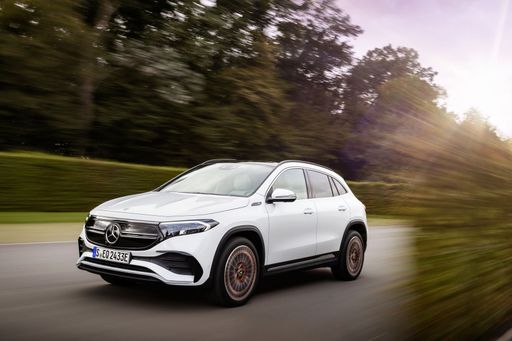
Mercedes EQA
Jeep Compass
The Jeep Compass packs classic Jeep styling with a surprisingly composed demeanor, equally at home turning heads in the city or tackling a weekend dirt track. Inside it's a pragmatic, user-friendly compact SUV that prioritizes comfort and versatility — a smart pick if you want a dose of adventure without giving up everyday sense.
details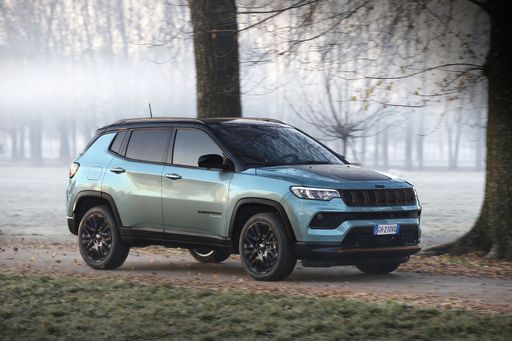
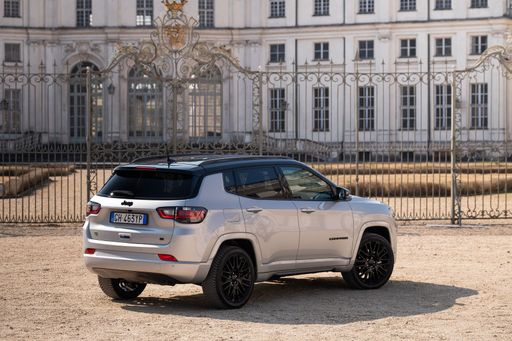
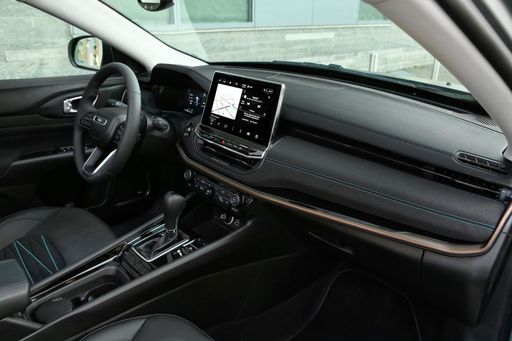
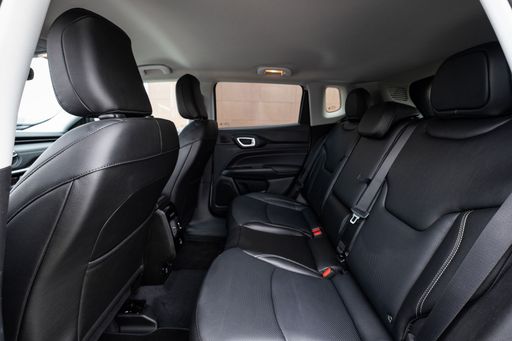
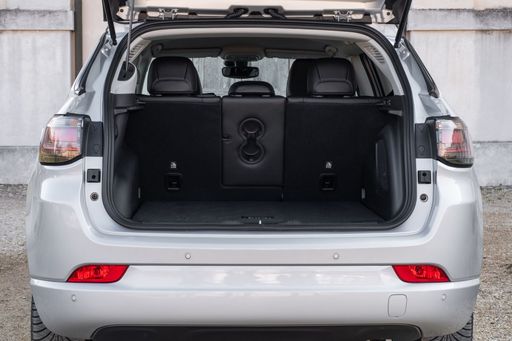
Mercedes EQA
The Mercedes EQA slips into the electric crossover ranks with the brand’s familiar luxury polish, offering a quiet, fuss-free drive that feels perfectly at home in the city or on a country escape. Inside it’s neatly finished and tech-forward, projecting grown-up refinement even if it plays things a bit safe for anyone chasing outright excitement.
details
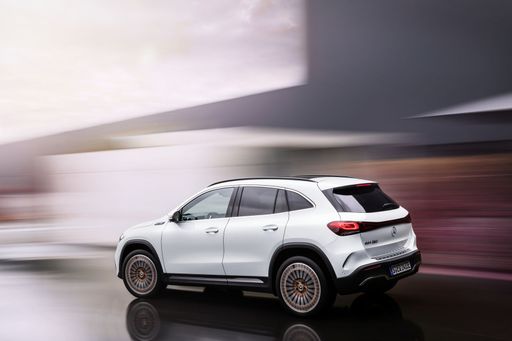
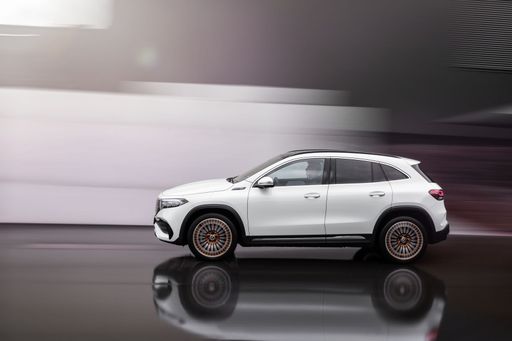
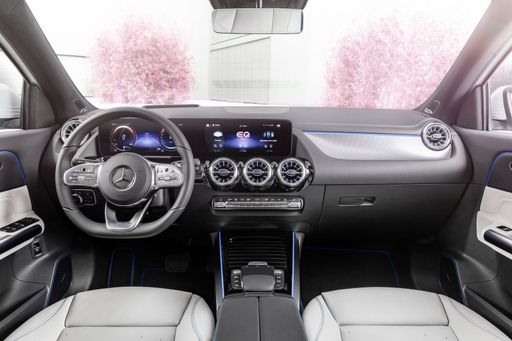
Costs and Consumption |
|
|---|---|
|
Price
34200 - 43200 £
|
Price
44200 - 57400 £
|
|
Consumption L/100km
5.80 L
|
Consumption L/100km
-
|
|
Consumption kWh/100km
17.50 kWh
|
Consumption kWh/100km
14.4 - 16.9 kWh
|
|
Electric Range
500 km
|
Electric Range
476 - 561 km
|
|
Battery Capacity
74 kWh
|
Battery Capacity
70.50 kWh
|
|
co2
0 - 130 g/km
|
co2
0 g/km
|
|
Fuel tank capacity
55 L
|
Fuel tank capacity
-
|
Dimensions and Body |
|
|---|---|
|
Body Type
SUV
|
Body Type
SUV
|
|
Seats
5
|
Seats
5
|
|
Doors
5
|
Doors
5
|
|
Curb weight
1667 - 2198 kg
|
Curb weight
2045 - 2115 kg
|
|
Trunk capacity
550 L
|
Trunk capacity
340 L
|
|
Length
4552 mm
|
Length
4463 mm
|
|
Width
1928 mm
|
Width
1834 mm
|
|
Height
1675 mm
|
Height
1608 - 1613 mm
|
|
Max trunk capacity
1561 L
|
Max trunk capacity
1320 L
|
|
Payload
-
|
Payload
425 kg
|
Engine and Performance |
|
|---|---|
|
Engine Type
Petrol MHEV, Electric
|
Engine Type
Electric
|
|
Transmission
Automatic
|
Transmission
Automatic
|
|
Transmission Detail
Dual-Clutch Automatic, Reduction Gearbox
|
Transmission Detail
Reduction Gearbox
|
|
Drive Type
Front-Wheel Drive
|
Drive Type
Front-Wheel Drive, All-Wheel Drive
|
|
Power HP
145 - 213 HP
|
Power HP
190 - 292 HP
|
|
Acceleration 0-100km/h
8.5 - 10.3 s
|
Acceleration 0-100km/h
6 - 8.6 s
|
|
Max Speed
180 - 188 km/h
|
Max Speed
160 km/h
|
|
Torque
230 - 345 Nm
|
Torque
385 - 520 Nm
|
|
Number of Cylinders
3
|
Number of Cylinders
-
|
|
Power kW
107 - 157 kW
|
Power kW
140 - 215 kW
|
|
Engine capacity
1199 cm3
|
Engine capacity
-
|
General |
|
|---|---|
|
Model Year
2025
|
Model Year
2024 - 2025
|
|
CO2 Efficiency Class
D, A
|
CO2 Efficiency Class
A
|
|
Brand
Jeep
|
Brand
Mercedes-Benz
|
What drivetrain options does the Jeep Compass have?
The Jeep Compass is available as Front-Wheel Drive.




